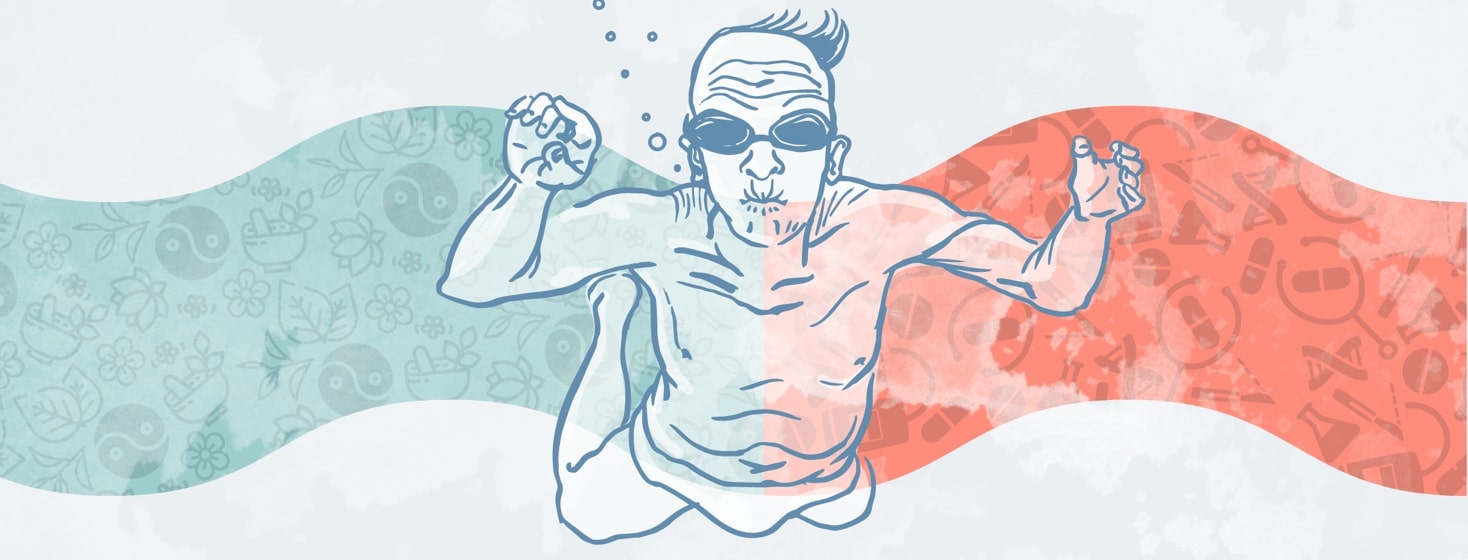Integrating Naturopathic Medicine with Traditional Medicine
My name is Bob, and I’m a cancer survivor. Last year, I looked at many treatment options and guided by my surgeon, the da Vinci robot has made my prostate cancer undetectable.
Stumbling across homeopathic and functional medicine
While researching my book “The Prostate Chronicles: A Medical Memoir” (June 2019 release), I explored complementary therapies including Homeopathic and Functional Medicine.
Homeopathic Medicine brought back memories of my golf buddies who ran to the health food store for this root and that root for their prostate problems. Admittedly, some herbs are “good” for you. We even use a plethora of herbs for healthy cooking.
I have not put much stock in over-the-counter homeopathic solutions. For starters, they aren’t FDA approved, there are concerns about the ingredient mix, the country of origin, and they can impact your blood pressure.
Functional Medicine practitioners use a systems approach to the body’s physiology tracking conditions over time. Since I was diagnosed with prostate cancer I discounted this approach because rooting out the cancer was my number one objective.
Naturopathic medicine opened my eyes
I’d never heard of Naturopathic Medicine and it was an eye-opener. It piqued my curiosity because a close friend’s wife graduated from a noted Naturopathic School in Southern California.
While researching my book, I read Dr. Mary Mielke’s blogs and studied Naturopathic medicine potential. I interviewed Dr. Mielke, ND (Naturopathic Doctor) and Dr. Tiffany Bloomingdale, ND at their offices at the Richmond Natural Medicine clinic in Richmond, VA to better understand the role they play when working with cancer patients.
According to Dr. Mielke, their practice provides “naturopathic supportive care for patients at all stages of their cancer diagnosis and treatment. This includes therapies which enhance the effectiveness of conventional treatment, reduce the side effects of their therapies and improves their overall quality of life.”
She added, “patients do best when receiving a combination of conventional and naturopathic care. We provide counseling and integrated care plans for patients who may be any place along the continuum – cancer prevention, pre-biopsy, post-diagnosis, early treatment, post-treatment, and maintenance.”
“We use basic lab tests,” Dr. Mielke explained, “to monitor what we call the ‘terrain’ of the individual. We all develop cancerous cells, but not everyone develops a tumor. In naturopathic medicine, we support the health of the whole person such that their ‘terrain’ is not amenable to cancer proliferation, helping the immune system remain effective at eliminating dysplastic cells.”
What is the DUTCH test?
One of the tests used by Naturopathic Doctors is the DUTCH Test (Dried Urine Test for Comprehensive Hormones.) This test is not used to diagnose or cure any specific disease, per se. The DUTCH Test focuses on which hormones are out of range including those that are age dependent.
The DUTCH test is also a detailed way to assess your adrenal function and sex hormones.
A collaborative integrated approach to cancer care
Digging deeper, Dr. Mielke pointed me to the Oncology Association of Naturopathic Physicians (OncANP) - a distinct healthcare profession focused on whole health solutions for cancer patients. Their approach is non-invasive and may include acupuncture, botanical medicine, clinical nutrition, physical medicine, and lifestyle counseling.
This is a collaborative integrated approach which is combined with the traditional treatments by the oncologist and is referred to as integrative oncology.
Be sure to always consult your doctor
There are Naturopathic Doctors in almost every state, but not all specialize in oncology supportive care. Ask your urologist or oncologist if they work with NDs. Many health insurance plans do not cover Naturopathic Medicine at this time although lab tests may be covered. Check with your insurer.
Finally, this in no way is an endorsement for Naturopathic Medicine. It’s written to help those diagnosed with prostate cancer to explore options in addition to traditional treatments. It’s important to remember that the oncologist and ND work in concert with each other to achieve a successful outcome.

Join the conversation